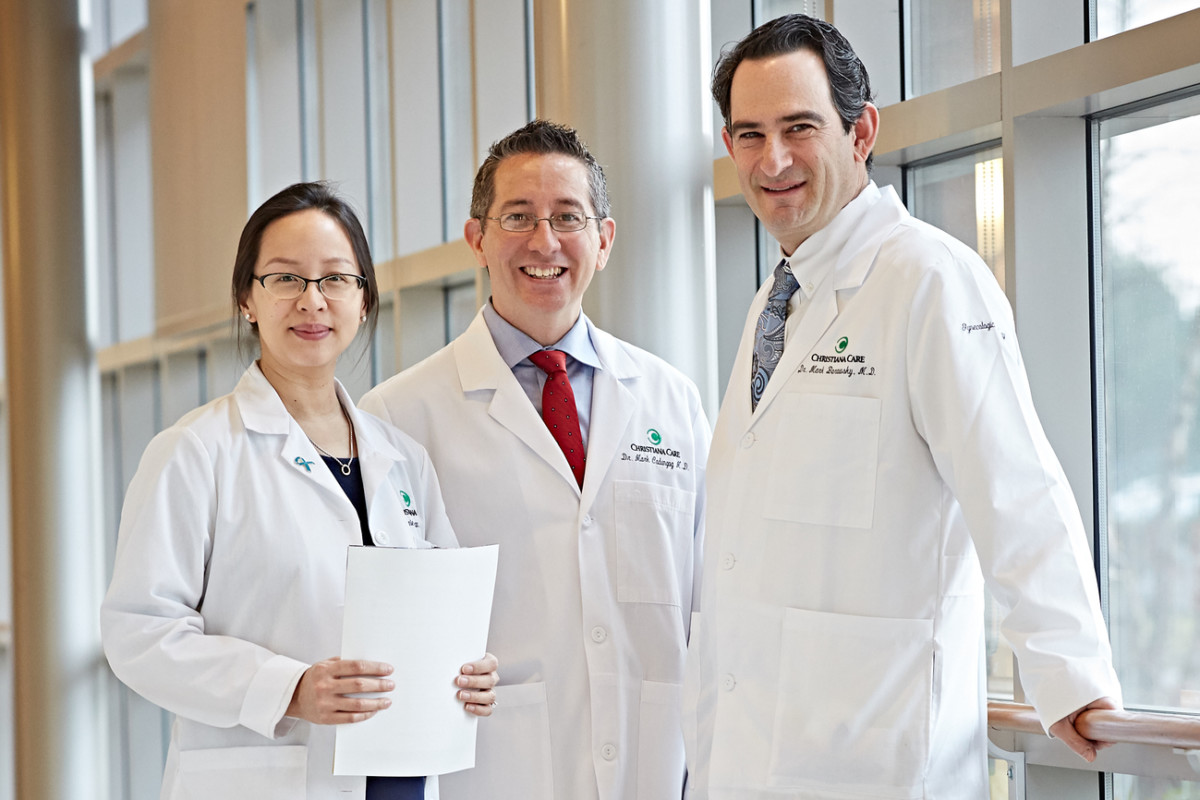Gynecologic oncologists at the Helen F. Graham Cancer Center & Research Institute collaborated with research scientists at The Wistar Institute in Philadelphia to discover a promising new treatment target for ovarian cancer.
“This discovery may allow us to overcome one of the greatest obstacles in using immunotherapy to treat ovarian cancer by identifying a marker that is present only on the cancer cells,” said Mark Cadungog, M.D., gynecologic oncologist and co-director of robotic surgery at Christiana Care, who is a co-author of the study recently published in the journal Clinical Cancer Research. “The majority of immunotherapies available at this point have significant side effects due to the immune system also attacking a patient’s normal healthy cells. This discovery could allow us to target only the cancer cells, while sparing the patient’s normal cells and lead to an elimination of treatment side effects. If the immune system can be used to recognize and destroy residual ovarian cancer cells, this could lead to a drastic reduction in ovarian cancer recurrence.”
Dr. Cadungo, Gynecologic Oncology Division Director Mark Borowsky, M.D., and Stephanie Jean, M.D., director of Gynecological Oncology Research, have been working with scientists at Wistar in their efforts to tease out how our body’s natural defense mechanisms might be enlisted to attack cancer cells. One shared goal is development of a safe and effective immunotherapeutic approach to treating ovarian cancer.
For the last several years, the team has facilitated shipment of blood and tissue samples from the Graham Cancer Center’s Tissue Procurement Center to the lab of José R. Conejo-Garcia, M.D., Ph.D., professor and program leader of Wistar’s Tumor Microenvironment and Metastasis Program.
Dr. Conejo-Garcia and his team have now identified a receptor protein that is expressed on the surface of different types of ovarian tumor cells. This protein is not found on any non-ovarian healthy tissues in adult women, and that makes it a very specific therapeutic target for a range of ovarian cancers, including the most aggressive subtypes.
What is more, the team has found that groundbreaking T-cell technology can be used against this protein to destroy the cancerous tumors with no reported adverse side effects.
“Partnerships such as ours with The Wistar Institute are key to accelerating the pace of discovery in cancer medicine,” said Nicholas J. Petrelli, M.D., Bank of America endowed medical director of the Helen F. Graham Cancer Center & Research Institute. “With Wistar, we are working to speed translation of discoveries made in their labs to clinical trials to benefit patients at the community level where 80 percent of cancer care is delivered.”
According to Dr. Conejo-Garcia, “Finding a receptor expressed exclusively on ovarian cells allows us to utilize groundbreaking targeted T-cell technology to potentially eliminate cancerous cells in patients.”
Using mouse models in the lab, his team engineered T-cells that would specifically target and destroy the ovarian cancer tumors expressing this newly identified protein. Dr. Conejo-Garcia has used ovarian tumor samples from the Tissue Procurement Center to verify that previous findings in animal models reflect what actually happens in human disease.
“These projects would not be feasible without our collaborators and could result in improved diagnostic and therapeutic interventions in the long-run,” Dr. Conejo-Garcia said. His laboratory studies are an important step toward one day using immunotherapy as an adjunct to surgery and chemotherapy to help prevent ovarian cancer recurrence, a major concern for women with advanced stages of disease.
The Graham Cancer Center’s historic partnership with Wistar, initiated in 2011, has led to several joint projects in basic science and translational cancer research under way and has already resulted in a number of jointly authored publications. Their collaboration is a first, bringing together the Graham Cancer Center, a National Cancer Institute selected Community Cancer Center, and The Wistar Institute, an NCI-designated cancer research center.



